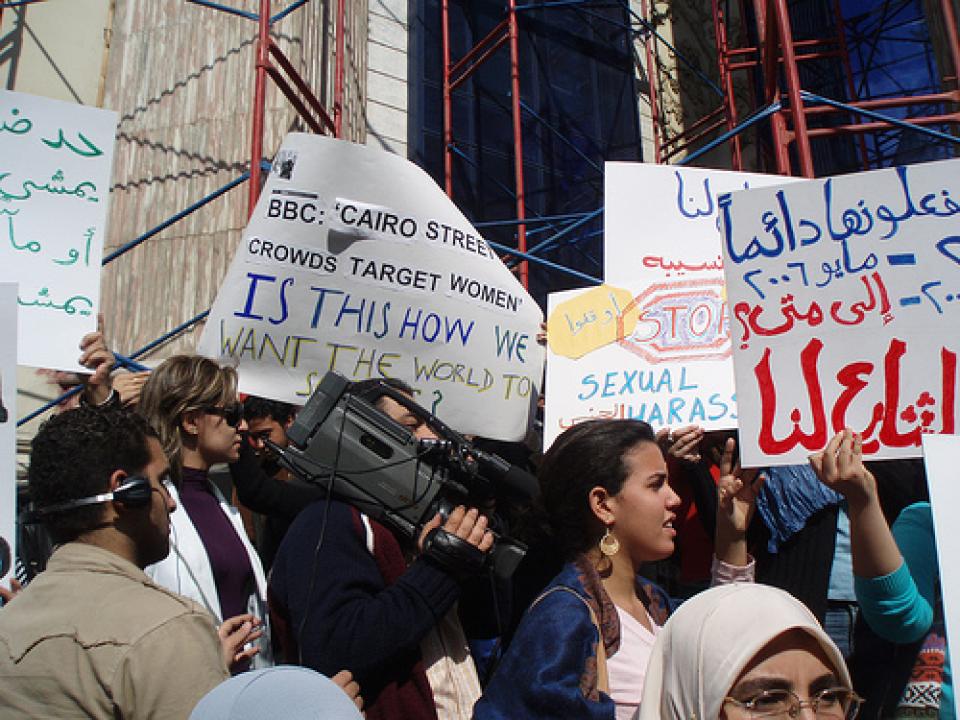
As part of our “Connect your rights: Internet rights are human rights” campaign, GenderIT.org correspondent Mavic Cabrera-Balleza interviewed Yara Sallam, Manager of the Women Human Rights Defenders Program at Nazra for Feminist Studies in Egypt. They talk about the challenging reality for women human rights defenders, how they are affected by measures taken by the government in the name of “national security”, and strategies used to address threats to WHRD’s cybersecurity.
Mavic Cabrera-Balleza (MCB): Please describe the scenario with regards to women’s human rights and women human rights defenders after the first election in post-Mubarak Eygpt.
Yara Sallam (YS): The post-election scenario gives a semblance of normalcy and certainty—we have a president; some people even call it a “second republic”. The committee that will draft the constitution has been formed. People are looking forward to a new regime and many are anticipating positive changes under this “second republic”.
However, women are underrepresented in nearly all the official structures that came with the post-election changes. The committee that will draft the constitution has 100 members and only seven are women. The new cabinet is composed of 34 ministers, only two are women (the Minister of Insurance and Social Affairs and the Minister of Scientific Research). In the presidential team, one out of four assistants is a woman. There are two women out of 17 members on the president’s advisory team. The process for selecting the representatives to these structures was neither clear nor transparent.
It also make us human rights defenders worry that one of the three deputies of the president believes that human rights are not universal; according to people who dealt with her during her work as a professor of political science at Cairo University, she holds that they are relative and contextual.
Despite all this, women human rights defenders are still motivated and very active. Women are united around a national cause and we are still mobilizing. If anything goes wrong, I have faith that we will take to the streets again to demand and protect our rights; to get our voices heard and ensure the pro-people and pro-women changes are instituted.
MCB: How does the issue of counter-terrorism including cybersecurity play out in the above scenario? Is cybersecurity an issue? How does it affect women human rights defenders?
YS: At the moment, the Egyptian authorities do not see or relate the protests against the Egyptian government to terrorism. Laws on counter terrorism are not formulated yet.
Women human rights defenders and other civil society actors – as well as unorganized activists – are branded thugs, but not terrorists. We are regarded as people who are out to destroy the country for our individual interests, or for foreign interest.
It’s ridiculous but the authorities believe that we are a threat to national security because we are thugs and/or foreign agents and we work with international actors. They also accuse us of taking money from foreigners to destroy Egypt.
An example of how their campaign against human rights organizations is working: they accused a few organizations and put some of the people working with them on trial. Last July, an NGO outside of Cairo was dissolved by virtue of an administrative decision because they were receiving funding from a foreign donor.
However, while the framework is not that of terrorism or counter-terrorism, emails and the use of internet are monitored. There is also media repression.
MCB: Are women human rights defenders participating in national or regional security debates?
YS: Currently, the discussions on national security issues are focused on the relationship with Israel; on securing Sinai. Women’s issues are not reflected at all in these discussions.
Human rights defenders and other activists are regarded as threats to national security but there is no specific targeting of women. Everyone is a target and part of the threat relates to our cybersecurity.
MCB: As a woman human rights defender, how have you been affected by measures taken by the government in the name of “national security” such as SMS blackouts, curfews, internet shutdowns or slowdowns, content filtering, registration policies in cybercafes and real name registration policies?
YS: To be honest, I don’t know if my emails are surveilled or not. But I make it a point not to send confidential emails, and the small circle in my work do the same thing as a precaution. A friend and fellow women human rights defender lost all her emails after her email account was hacked. However, encryption or using HTTPS is illegal in Egypt.
The threat to cybersecurity has been there since the onset of the revolution and it affects all activists not just women human rights defenders. A report by Ramy Raoof, the Editor of Egyptian Blog for Human Rights, indicates that since the April 6th 2008 strike, the State Security Investigations (SSI) and other security agencies have paid more attention to activists online and cell phone communications.
The SSI established an Emergency Unit responsible for cutting off internet connections; blocking websites; extracting information about netizens shutting down mobile phone companies; shutting down bulk-SMS services and ensuring that telecommunications companies quickly respond to demands by security authorities.
Government has total access and control of all means of communication not just electronic communication. During the 18 days of the revolution, the government closed the internet provision to and mobile numbers of some activists. Activist bloggers such as Alaa Abd El Fattah and Maikel Nabil Sanad were accused of disturbing public order and disclosing military secrets respectively by the military regime.
The government can order telecommunication companies to give them information they want or to close the accounts of certain individuals or groups. If they do not cooperate, their business license can be taken away from them.
MCB: To what extent do national security/counter-terrorism plans address digital security concerns of women human rights defenders in Egypt? For example, ensuring protection of women human rights defenders who are the target of terrorism, or cartel violence, or women human rights defenders working in community media/citizens journalism.
YS: I don’t think this is done at all.
MCB: What are the practical strategies that women human rights defenders have undertaken to address threats to cybersecurity?
YS: Through the Association for Progressive Communications, I learned about encrypting emails. Encrypting is useful because it provides an additional layer of protection by preventing the content of our emails and other online documents from being read by unintended recipients. However, I must admit that I don’t do this on a regular basis because if I send an encrypted email to co-workers or colleagues, I still need to teach them how to decrypt my message so they can read them.
There’s very low awareness of and concern about cybersecurity among Egyptian women human rights defenders and other activists at present. They don’t take time to safeguard their privacy settings. This concerns me especially because women are always an easy target for the authorities. Women human rights defenders, and other communities who do not conform with societal norms, become much more vulnerable.
Most women human rights defenders do not have the technical skills to ensure their own cybersecurity. Several complained about hacking but we are not able to provide security training for those women human rights defenders.
As a first step, we need to recognize the threats to our cybersecurity, then we need to gather more information. Then we need to seek technical assistance from our colleagues in the techie community here in Egypt – which is small, with very few women techies. We need to make cybersecurity integral to our work as women human rights defenders and treat it as a priority.
This article is a part of APC’s “Connect your rights: Internet rights are human rights” campaign financed by the Swedish International Development Cooperation Agency .
_Photo by Hossam el-Hamalawy. Used with permission under Creative Commons licence 2.0. _
- 8706 views







Add new comment